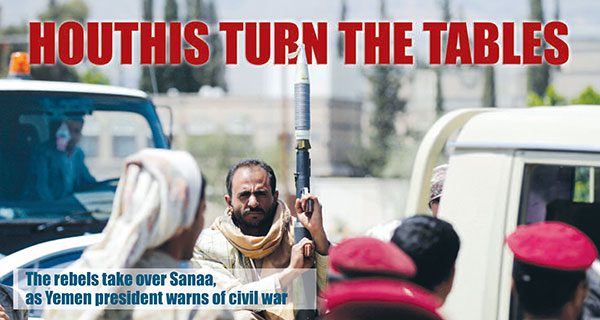
|
| A Houthi rebel holds an RPG near the presidential palace in the Yemeni capital of Sanaa on Wednesday Photo: Khaled Abdullah/Reuters. |
SANAA — President Abd-Rabbu Mansour Hadi has warned Yemenis their country is heading toward civil war after the takeover of the capital by Houthi rebels, a move that has allowed the insurgents to dictate terms to a weakened, fractured government.
“(The combat in Sanaa) emphasizes to us the painful bitterness of fighting among our people and the danger of entering into a civil war,” Hadi said in a speech to political and security chiefs at his headquarters on Tuesday.
Any such war would likely pit the Shi’a Houthi rebels against an alliance of Sunni Islamist and tribal interests united by a few top families and generals.
The Houthis struck a deal that will make them a part of the government, but it is not clear if that will satisfy their demands or if it will instead embolden them to seek further powers.
Against the backdrop of a fragmented political, tribal and sectarian scene, any renewed fighting could also allow an array of other groups, including southern separatists, former leader Ali Abdullah Saleh and even al-Qaeda to take advantage.
Lisa Monaco, an aide to President Obama on counterterrorism issues, phoned Hadi on Wednesday to express Obama’s support for his leadership and condemnation of the Houthis.
“She urged all parties to pursue reconciliation and underscored the United States’ determination to designate individuals who threaten Yemen’s peace, stability, and security,” the White House said in a statement
There is also a risk that Yemen, strategically located on major oil shipping routes and next to top Gulf crude exporters, could become a new front in a region-wide tussle for influence between Iran and Saudi Arabia.
Yemen freed at least three suspected Iranian Revolutionary Guard members on Thursday who had been held for months over alleged ties to the Houthis, a senior official said. The release suggests that the rebels are now dictating terms in the capital.
The state’s writ, weakened by a 2011 uprising that led the following year to the transfer of power from Saleh, now extends just a few miles from Hadi’s presidential palace, as heavily armed Houthi fighters guard the central bank and army bases it seized this week.
The main losers from the Houthi advance appeared to be Sunni Islamist party Islah and its leaders from the al-Ahmar family, which dominates a major tribal bloc, and military strongman General Ali Mohsen al-Ahmar, who is from a different clan.
His First Armoured Brigade was overrun by the Houthis when they entered Sanaa on Sunday, marking a serious reversal for the general, whose troops remained loyal to him instead of the government after Yemen’s uprising and transition of power.
Despite a U.N.-mediated deal to stop four days of fighting on Sunday, the future depends very much on the Houthis’ next steps.
“Either they stick to the agreements and operate as a political movement, withdrawing from the city shortly,” said Yemeni analyst Hatem Bamehriz. “Or they stay in Sanaa and from there enter into a civil war.”
The Houthis, who began as a local movement aimed at promoting Zaydi Shi’ism in the face of encroaching Sunni belief in the late 1990s, have morphed over the past 15 years into a powerful insurgent force by tapping wider grievances of northern Yemenis.
After the 2011 uprising, their demands for greater autonomy of northern areas were partly addressed, but they were left out of the transitional government and won over many of those disillusioned by Hadi’s faltering attempts to govern.
Hadi, a 69-year-old army general and Saleh’s soft-spoken and unremarkable deputy, inherited a nation in chaos: the economy was collapsing, al-Qaeda repeatedly struck at the army, and separatist movements in both north and south festered.
His selection as interim leader under a transition plan backed by the U.N. and Arab neighbors in a 2012 referendum in which he was the only candidate lent tinder to a “people’s revolution” the Houthis now claim to have won by the gun.
The Houthis say their push into Sanaa was a victory for popular demands unanswered in the 2011 revolution, namely an end to corruption and relief for Yemen’s impoverished people.
When Hadi bowed this month to weeks of street protests by Houthi loyalists, firing his government and cutting back unpopular fuel price hikes, the rebels stood firm, leading critics to wonder whether their aim was a government takeover all along.
The Houthis’ ties to Iran have prompted comparisons in neighboring Saudi Arabia between the rebel group and Lebanon’s Hizbullah.
What some now fear is that the overarching rivalry between Tehran and Riyadh could make Yemen the arena for a new proxy struggle in their region-wide tussle for power.
-Reuters, TAAN






Leave a Reply